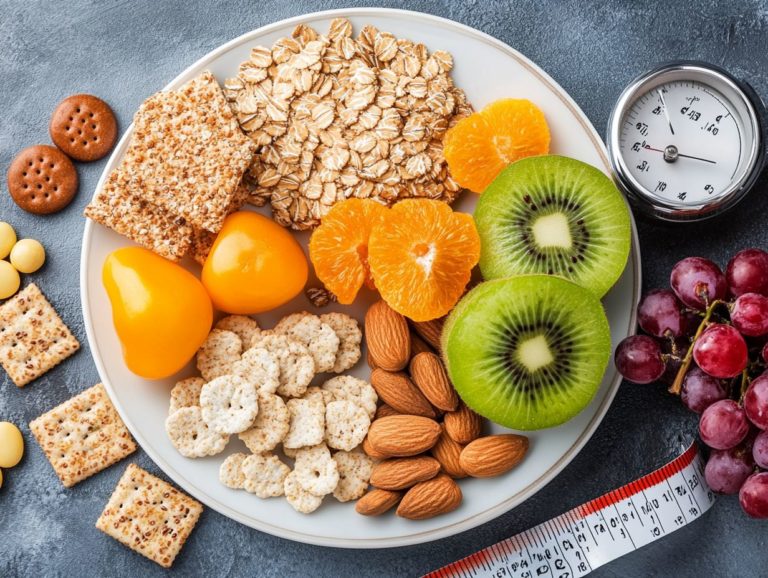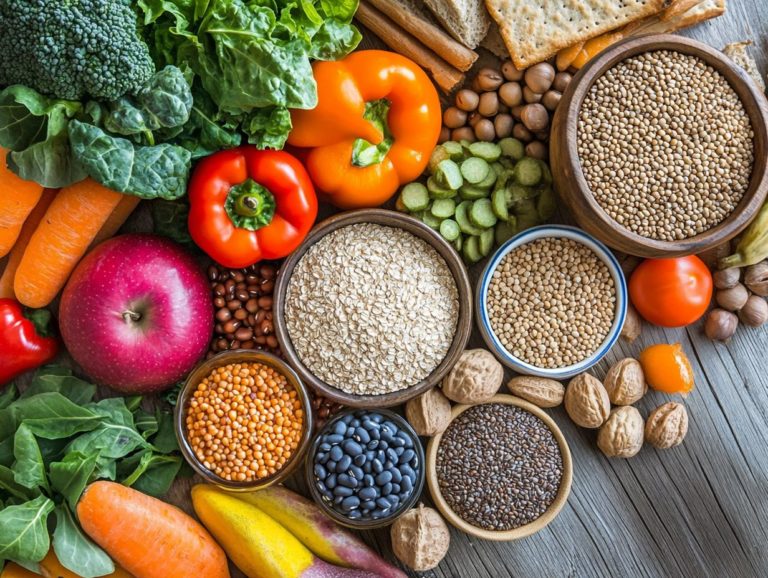How to Cut Down on Sugar in Your Diet
Excessive sugar intake has emerged as a significant concern in today s health landscape, closely associated with a multitude of health risks, including obesity, diabetes, and heart disease.
Many individuals remain unaware of the hidden sugars lurking in their everyday foods and beverages. This guide will help you take control of your sugar intake by empowering you with the knowledge to identify these sources and offering practical strategies for reducing sugar consumption.
It will also delve into alternative sweeteners and demonstrate how to craft a balanced diet that doesn t compromise on flavor. By making simple adjustments, you can pave the way toward a healthier lifestyle.
Contents
- Key Takeaways:
- The Dangers of Excessive Sugar Intake
- Identifying Hidden Sources of Sugar
- Ways to Cut Down on Sugar Intake
- Alternative Sweeteners to Consider
- Creating a Balanced Diet Without Excess Sugar
- Frequently Asked Questions
- What are some easy ways to cut down on sugar in my diet?
- Why is it important to cut down on sugar in my diet?
- Can I still satisfy my sweet tooth without consuming as much sugar?
- Are there any hidden sources of sugar that I should be aware of?
- How long does it take to notice a difference in my health when cutting down on sugar?
- Is it okay to enjoy sugary treats occasionally?
Key Takeaways:

- Know the health risks of too much sugar, like obesity and diabetes.
- Spot hidden sugars in everyday foods and choose lower-sugar options.
- Use practical tips such as reading labels and cutting portion sizes to reduce sugar.
The Dangers of Excessive Sugar Intake
Excessive sugar intake presents serious health risks, including obesity, diabetes, and heart disease, making it a serious health problem today. This issue is often driven by the increasing consumption of processed foods and beverages, which harbor hidden added sugars that far surpass the dietary guidelines set by health organizations.
Long-term high sugar intake also affects mental health, leading to issues like sugar cravings and energy fluctuations. Recognizing the dangers linked to high sugar levels is crucial for anyone striving to make healthier food choices and meet their sugar intake goals.
Potential Health Risks
The health risks tied to excessive sugar consumption are profound and far-reaching, impacting your physical and mental well-being significantly.
Research has demonstrated that eating too much sugar can play a pivotal role in the chronic conditions that afflict modern society. For instance, consistently indulging in sugary foods and beverages can lead to insulin resistance, substantially increasing your risk of developing diabetes.
The link between sugar consumption and obesity is glaring, as sugary products are often packed with empty calories that fail to satisfy your hunger, leading to overeating. Heart disease also lurks in this equation; elevated sugar levels can trigger hypertension and inflammation, both critical risk factors.
Don t overlook the mental health implications either; studies indicate that high sugar intake may be linked to anxiety and depression, creating a challenging cycle of health issues that can be hard to escape.
Identifying Hidden Sources of Sugar
Identifying hidden sources of sugar in your diet is essential for managing sugar intake and enhancing your overall health. Many common processed foods, like low-fat yogurt, breakfast cereals, and fruit juices, often sneak in high levels of added sugars, contributing significantly to your daily sugar consumption without you even realizing it.
This underscores the importance of scrutinizing food labels diligently; they can unveil unexpected sugar content lurking in the ingredients. By becoming aware of these hidden sugars, you can make healthier choices, such as opting for whole foods and sugar-free alternatives that align with your dietary guidelines and personal health aspirations.
Start reading labels today and make healthier choices for a better tomorrow!
Common Foods and Drinks High in Sugar

Many everyday foods and drinks, like breakfast cereals and fruit juices, are packed with sugar, making them surprisingly unhealthy choices.
Take granola bars, for instance. Can you believe that they can contain more sugar than a candy bar? This leads you to underestimate their true impact. Sweetened yogurt varieties are another culprit. They often have added sugars that turn a potentially nutritious snack into a sugar-heavy option.
Let s not forget about sodas! They are infamous for their excessive sugar levels one serving can easily exceed your daily recommendations.
To navigate this sugary landscape, it s crucial to read nutrition labels. Look out for ingredients like high fructose corn syrup, a sweetener made from corn that can be worse for your health. This way, you can make informed food choices. Remember, excessive sugar intake can lead to serious health issues like obesity, diabetes, and heart disease. Mindful consumption is essential!
Ways to Cut Down on Sugar Intake
To effectively reduce sugar intake, adopt a range of strategies that foster healthier eating habits and encourage mindful consumption. One particularly effective approach is meticulous meal planning, which enables you to incorporate nutrient-rich foods and avoid processed options packed with added sugars.
Practice portion control. This is essential for managing your sugar consumption, allowing you to indulge in sweet treats without succumbing to cravings. By prioritizing whole foods and healthier snacks, you can significantly cut back on sugar and cultivate a more balanced diet.
Practical Tips and Strategies
Implementing practical tips and strategies can greatly assist you in reducing sugar intake while elevating your overall dietary habits.
By making conscious choices, you can gradually lessen your dependence on sugary products. For instance, opting for sugar-free drinks instead of sodas not only cuts down on sugar consumption but also fosters healthier hydration habits.
Incorporating sugar substitutes allows you to enjoy sweetness without the calorie burden of traditional sugars, letting you indulge without the guilt. When you prepare meals at home, you gain control over your ingredients. This helps you avoid hidden sugars that often lurk in restaurant dishes or packaged foods.
These simple adjustments enhance your food choices and support your long-term goals for sugar intake, ultimately leading to improved health outcomes and a boost in vitality.
Alternative Sweeteners to Consider
Considering alternative sweeteners presents a refined opportunity to indulge in sweetness while sidestepping the downsides of excessive sugar consumption. While natural sugars from fruits and certain sweeteners like honey offer healthier options, it s crucial to scrutinize the health effects of artificial sweeteners.
These vary significantly, with some providing fewer calories but raising valid concerns about long-term safety. By exploring the advantages and disadvantages of various sugar substitutes, you enable yourself to make informed decisions that align seamlessly with your dietary preferences and personal health objectives.
Explore these options and take control of your health today! Start reading labels and making smarter choices!
Comparing Natural and Artificial Sweeteners

When you compare natural and artificial sweeteners, it s essential to look at their unique properties, health effects, and calorie content.
Natural sweeteners, like honey and maple syrup, come with additional nutrients and antioxidants that can enhance your wellness. They deliver a rich and complex flavor profile.
On the other hand, artificial sweeteners such as aspartame and sucralose are calorie-free, making them appealing options for those looking to cut calories.
However, ongoing concerns exist regarding the long-term health implications of these synthetic alternatives. Some studies hint at a potential link to metabolic issues problems related to how your body processes food. Weigh the benefits of natural sweeteners like their possible anti-inflammatory properties against the convenience and calorie control offered by their artificial counterparts. This careful consideration will help you make informed dietary choices.
Creating a Balanced Diet Without Excess Sugar
You can easily create a balanced diet that cuts down on excessive sugar. Approach it with thoughtful planning and a commitment to integrating nutritious foods into your daily menu.
By prioritizing whole foods rich in essential nutrients, you can enjoy a delightful variety of flavors and textures while keeping added sugars at bay.
Meal planning is essential in this journey. It enables you to make deliberate choices about healthy snacks and meals that satisfy your cravings and curb sugar intake. This mindful approach nurtures your health and paves the way for enduring lifestyle changes that enhance your overall well-being.
Incorporating Nutritious Foods and Moderation
Incorporating nutritious foods into your diet relies on understanding moderation and making smart food choices. By selecting a variety of whole grains, lean proteins, fruits, and vegetables, you can craft balanced meals that nourish your body.
Pay attention to portion sizes; even healthy foods can lead to excess calories if consumed in large quantities. Consider swapping traditional snacks for healthier alternatives like fresh fruit instead of chips or yogurt instead of ice cream. These small changes can significantly improve your overall health.
Embracing these practices helps you cultivate better eating habits that promote longevity and well-being.
Frequently Asked Questions
What are some easy ways to cut down on sugar in my diet?

1. Start by reading nutrition labels and avoiding products with high amounts of added sugars.
2. Replace sugary drinks like soda and juice with water or unsweetened tea.
3. Use natural sweeteners like honey or maple syrup instead of processed sugars in your cooking and baking.
4. Choose whole fruits over dried fruits or fruit juices, which tend to have more concentrated sugars.
5. Gradually decrease the sugar you add to your coffee or tea until you no longer need it.
6. Experiment with different spices and herbs to add flavor to your meals without relying on added sugars.
Why is it important to cut down on sugar in my diet?
Sugar provides empty calories and can lead to weight gain, increased risk of chronic diseases, and tooth decay. Cutting down on sugar can improve your overall health and reduce these risks.
Can I still satisfy my sweet tooth without consuming as much sugar?
Yes, there are many delicious and nutritious alternatives to satisfy your sweet cravings. Options include fresh fruit, dark chocolate, and homemade treats using natural sweeteners.
Are there any hidden sources of sugar that I should be aware of?
Absolutely. Many packaged and processed foods, such as sauces, dressings, and even bread, contain added sugars. It’s important to read labels and choose options with little to no added sugars.
Start today for a healthier you!
How long does it take to notice a difference in my health when cutting down on sugar?
Your results depend on how much sugar you currently consume.
Generally, you might feel more energetic, lose weight, and notice overall health improvements within a few weeks to a few months of reducing sugar intake.
Is it okay to enjoy sugary treats occasionally?
Yes! Enjoying sugary treats is fine as long as you do it in moderation.
Treating yourself sometimes is important, but keep an eye on your total sugar intake and choose healthier options when you can.






